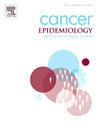Validation of self-reported cancer diagnoses in the Korean Atomic Bomb Survivor Cohort study
IF 2.4
3区 医学
Q3 ONCOLOGY
引用次数: 0
Abstract
Background
Owing to the short history of the National Cancer Registry, self-reported cancer history is an important source of morbidity in recently constructed cohorts or cohorts of the older population. This study aimed to evaluate the validity of the self–reported cancer history gathered through the Korean Atomic Bomb Survivor Cohort (K-ABC) study compared with the Korean Central Cancer Registry (KCCR).
Methods
Among the K-ABC participants recruited from 2020 to 2024, self-reported cancer history from 1756 participants was linked to the KCCR. The sensitivity, specificity, positive predictive value (PPV), negative predictive value (NPV), and kappa coefficient were estimated for each cancer site.
Results
Among 181 participants with a minimum of one record in the KCCR, 164 reported a history of cancer. Overall cancers and each cancer site showed high sensitivity, PPV, and kappa values of > 80 %, > 66 %, and > 0.73, respectively, except for cervical and lung cancers, which showed sensitivities of < 50 % and kappa values of 0.33 and 0.59, respectively. High specificity and NPV (≥99 %) were observed for all cancer sites.
Conclusions
The validity of the self-reported cancer history of the K-ABC showed a relatively high level of agreement with the KCCR records. These findings indicate that self-reported cancer information from the K-ABC study is valid for all sexes and ages but needs consideration when used for evaluating cervical and lung cancer.
在韩国原子弹爆炸幸存者队列研究中验证自我报告的癌症诊断结果
背景:由于国家癌症登记处的历史较短,自我报告的癌症病史是最近建立的队列或老年人群队列中发病率的重要来源。本研究旨在评估通过韩国原子弹幸存者队列(K-ABC)研究收集的自我报告癌症病史与韩国中央癌症登记处(KCCR)的有效性。方法在2020年至2024年招募的K-ABC参与者中,1756名参与者自我报告的癌症病史与KCCR相关。对每个肿瘤部位的敏感性、特异性、阳性预测值(PPV)、阴性预测值(NPV)和kappa系数进行估计。结果在KCCR中至少有一次记录的181名参与者中,164名报告了癌症史。除宫颈癌和肺癌的敏感性分别为<; 50 %和kappa值0.33和0.59外,所有癌症和每个癌症部位的PPV和kappa值分别为>; 80 %,>; 66 %和>; 0.73。在所有癌症部位均观察到高特异性和NPV(≥99 %)。结论自我报告的K-ABC癌史的有效性与KCCR记录的一致性较高。这些发现表明,K-ABC研究中自我报告的癌症信息对所有性别和年龄都有效,但在用于评估宫颈癌和肺癌时需要考虑。
本文章由计算机程序翻译,如有差异,请以英文原文为准。
求助全文
约1分钟内获得全文
求助全文
来源期刊

Cancer Epidemiology
医学-肿瘤学
CiteScore
4.50
自引率
3.80%
发文量
200
审稿时长
39 days
期刊介绍:
Cancer Epidemiology is dedicated to increasing understanding about cancer causes, prevention and control. The scope of the journal embraces all aspects of cancer epidemiology including:
• Descriptive epidemiology
• Studies of risk factors for disease initiation, development and prognosis
• Screening and early detection
• Prevention and control
• Methodological issues
The journal publishes original research articles (full length and short reports), systematic reviews and meta-analyses, editorials, commentaries and letters to the editor commenting on previously published research.
 求助内容:
求助内容: 应助结果提醒方式:
应助结果提醒方式:


